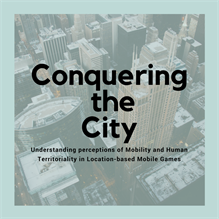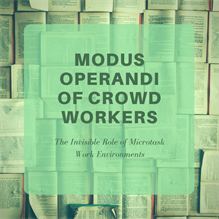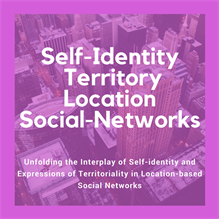The MRL Goes to Ubicomp 2017
 Members of the Mixed Reality lab will be travelling to Ubicomp this year to present two full papers and one note. Much of this work has been achieved through collaborative efforts between researchers at different universities and countries. All Ubicomp papers that are to be presented also included in the new ACM journal, Proceedings of the ACM on Interactive, Mobile, Wearable and Ubiquitous Technologies (IMWUT).
Members of the Mixed Reality lab will be travelling to Ubicomp this year to present two full papers and one note. Much of this work has been achieved through collaborative efforts between researchers at different universities and countries. All Ubicomp papers that are to be presented also included in the new ACM journal, Proceedings of the ACM on Interactive, Mobile, Wearable and Ubiquitous Technologies (IMWUT).
Full Papers
Conquering the City: Understanding perceptions of Mobility and Human Territoriality in Location-based Mobile Games
With the increasing popularity of mobile video games, game designers and developers are starting to integrate geolocation into video games. Popular location-based games such as Ingress or Pokémon Go have millions of users, yet little is known about how the use of such games influences the nature of a user’s interaction with other users and their physical surroundings. To investigate how location-based games are integrated into a player’s daily life, how they influence a player’s mobility through the city, their perception of places and the role of human territoriality in this context, we have developed a location-based mobile multiplayer game called CityConqueror. In this paper, we present CityConqueror and the results of a study, which has focused on participants playing the game over a period of two weeks. The findings show that location-based games can be designed to give the player the illusion of playing in the context of the “real” world rather than a virtual or hybrid game reality. Our findings also suggest that location-based games can have a strong influence on a player’s mobility and perception of the urban space and that human territoriality can be expressed in location-based games. Based on our findings we propose a series of design implications for the design of mobile location-based games.

Konstantinos Papangelis, Melvin Metzger, Yiyeng Sheng, Hai-Ning Liang, Alan Chamberlain, and Ting Cao.
Modus Operandi of Crowd Workers: The Invisible Role of Microtask Work Environments
The ubiquity of the Internet and the widespread proliferation of electronic devices has resulted in flourishing microtask crowdsourcing marketplaces, such as Amazon MTurk. An aspect that has remained largely invisible in microtask crowd-sourcing is that of work environments; defined as the hardware and software affordances at the disposal of crowd workers which are used to complete microtasks on crowdsourcing platforms. In this paper, we reveal the significant role of work environments in the shaping of crowd work. First, through a pilot study surveying the good and bad experiences workers had with UI elements in crowd work, we revealed the typical issues workers face. Based on these findings, we then deployed over 100 distinct microtasks on CrowdFlower, addressing workers in India and USA in two identical batches. These tasks emulate the good and bad UI element designs that characterize crowdsourcing microtasks. We recorded hardware specifics such as CPU speed and device type, apart from software specifics including the browsers used to complete tasks, operating systems on the device, and other properties that define the work environments of crowd workers. Our findings indicate that crowd workers are embedded in a variety of work environments which influence the quality of work produced. To confirm and validate our data-driven findings we then carried out semi-structured interviews with a sample of Indian and American crowdworkers from this platform. Depending on the design of UI elements in microtasks, we found that some work environments support crowdworkers more than others. Based on our overall findings resulting from all the three studies, we introduce ModOp, a tool that helps to design crowdsourcing microtasks that are suitable for diverse crowd work environments. Weempirically show that the use of ModOp results in reducing the cognitive load of workers, thereby improving their user experience without affecting the accuracy or task completion time.

Ujwal Gadiraju, Alessandro Checco, Neha Gupta, and Gianluca Demartini.
Note
Unfolding the Interplay of Self-identity and Expressions of Territoriality in Location-based Social Networks
Self-identity in mobile location-based social networks (LBSN) is a relatively underexplored topic. In this paper, through a six-week study, utilising a novel LBSN called GeoMoments, we build upon the understanding that LBSN use can play an integral role in the self-identity of its users and introduce a relationship between self-identity and expressions of territoriality in LBSN. The primary purpose of this paper is to draw attention to the importance of potentialities of power facilitated by identity claims over an area, and the temporal nature of the polysemic meaning of physical places in LBSN so they can be drawn as a resource for design.

Konstantinos Papangelis, Yiyeng Sheng, Hai-Ning Liang , Alan Chamberlain, Vassilis-Javed Khan, and Ting Cao.
References
Full Papers
Konstantinos Papangelis, Melvin Metzger, Yiyeng Sheng, Hai-Ning Liang, Alan Chamberlain, and Ting Cao. 2017. Conquering the City: Understanding perceptions of Mobility and Human Territoriality in Location-based Mobile Games. Proc. ACM Interact. Mob. Wearable Ubiquitous Technol. 1, 3, Article 90 (September 2017), 24 pages. DOI: https://doi.org/10.1145/3130955
Ujwal Gadiraju, Alessandro Checco, Neha Gupta, and Gianluca Demartini. 2017. Modus Operandi of Crowd Workers: The Invisible Role of Microtask Work Environments. Proc. ACM Interact. Mob. Wearable Ubiquitous Technol. 1, 3, Article 49 (September 2017), 29 pages. https://doi.org/10.1145/3130914
Note
Konstantinos Papangelis, Yiyang Sheng, Hai-Ning Liang, Alan Chamberlain, Vassilis-Javed Khan, and Ting Cao. 2017. Unfolding the interplay of self-identity and expressions of territoriality in location-based social networks. In Proceedings of the 2017 ACM International Joint Conference on Pervasive and Ubiquitous Computing and Proceedings of the 2017 ACM International Symposium on Wearable Computers (UbiComp '17). ACM, New York, NY, USA, 177-180. https://doi.org/10.1145/3123024.3123081
Posted on Wednesday 23rd August 2017